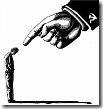 (This is part 2 of a 2-part series on guilt and shame. For part 1, click here.)
(This is part 2 of a 2-part series on guilt and shame. For part 1, click here.)
Guilt and shame are two emotions that we feel from a very young age. Both emotions result in us feeling negatively and are emotions intended to guide our future behavior. While on the surface these emotions might seen intricately connected, and often are confused for each other, the causes and implications for each are entirely differently.
Guilt is when we feel bad about something we’ve done. It is what we feel when we make mistakes or hurt someone’s feelings, intentionally or unintentionally. Guilt is often associated with remorse, or a feeling of wanting to undo the action or make up for consequences of our behavior.
When we feel guilty, we negatively evaluate how we have acted, often having thoughts such as, “I feel bad I did that.” Feeling guilty requires being able to understand how your actions might have affected another person. In essence, people who lack empathy will rarely, if at all, feel guilty for their hurting someone or making a mistake.
While our actions are the focus of our negative feelings when we feel guilt, the object of shame is ourselves. Guilt is when we believe our action was bad, shame is when we think we are bad. Thoughts associated with feeling shame are often self-deprecating and are associated with a belief that we are inherently flawed and not good enough. Shame is associated with feelings of inadequacy, worthlessness, or unworthiness.
To further illustrate the difference, imagine if you said something hurtful to a friend. To feel bad that you said something is to feel guilty. But if you find yourself repeating things like, “How could you say that?” or “That’s such a stupid thing to say” or feeling like you deserve to be punished, that is shame.
Guilt has a pro-social function in that it requires people to know how to behave in an acceptable manner and how to identify consequences of their own actions. These are both necessary to maintain harmony in any relationship, both personal and professional. Shame on the other hand is a self-destructive emotion that, for some, has strong connections to developing and maintaining low self-esteem, depression and anxiety. For others, shame can trigger episodes of anger, rage or envy. It is very common for a person who feels shame to try and make those closest to them feel ashamed as well in an effort to manage their own overwhelming feelings of worthlessness. Because shame is such a personal and damaging emotion, rarely do we divulge to anyone what made us feel ashamed whereas a wrongdoing we feel guilty about is easy to share.
Parents who teach their children to feel ashamed for their behaviors are teaching them to negatively evaluate who they are as opposed to what they did. The children are left feeling isolated, alone and overwhelmed by what a “bad child” they are and how there is very little they can do to remedy that. However, if they are taught to feel guilty about their action, they learn that they are still a “good child” who makes mistakes, which are easier to fix. Adults, teens and children who are around an abusive person are instilled with a feeling of shame as are those who are bullied.
Given the significant fundamental differences, can you identify when someone might be feeling guilty versus feeling shameful? In the examples from the previous article, Mita and Ankur felt ashamed while Shubha felt guilty. The first two exhibited behavioral and cognitive symptoms of shame, namely wanting to hide, feeling or making oneself smaller as if to protect themselves and having negative self-evaluations about their situation.
In Mita’s case, being so young, her mother was instilling shame in her by reinforcing the belief that a hurtful action defines who Mita is as a sister and a person. On the flip side, Shubha felt bad about not submitting a report, not that she was a bad person for forgetting. She felt remorse and wanted to amend the situation, which was shown by her quickly offering to do what it took to make up for her error.
We would love your thoughts about this article. Please leave your comments below.
